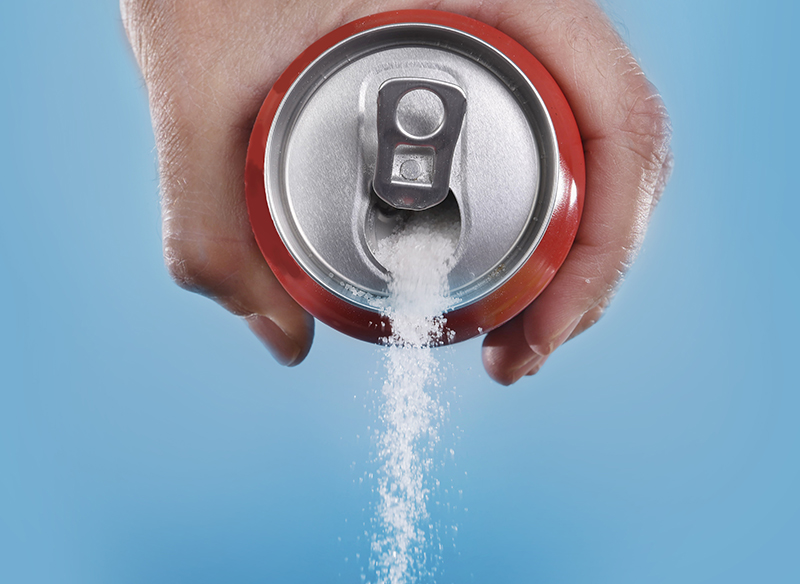
When is the last time you were in a grocery store or restaurant and they did not sell Coca-Cola or Pepsi? It’s probably hard to recall a time, right? That’s because Coca-Cola and Pepsi products are everywhere. They sell their products all across the globe and spend an astounding amount of money in advertising.1 Unfortunately, these large companies target a significant amount of their marketing towards vulnerable populations, resulting in extremely poor oral health conditions and chronic diseases in those populations.1
Besides tooth decay, soda has also been known to lead to obesity, diabetes, and heart disease.2 This is because of the high amount of sugar in soda. A 12-ounce soda contains 39 grams or 10 packets of sugar.3,4 Someone who drinks one sugary drink or more per day is 27 percent more likely to be overweight, 26 percent more likely to develop type 2 diabetes, 20 percent more likely to have a heart attack, and twice as likely to develop a cavity than non-soda drinkers.2
Sadly, these negative health effects do not hinder these huge companies from promoting their products. By 2020, Coca-Cola will have spent $12 billion marketing to Africa and PepsiCo will have spent $5.5 billion expanding their products in India.1
In addition to low-income countries, television ads are highly targeted to children, adolescents, and people of color.2 Most of these populations lack education on the dangers of sugar. As Marion Nestle, a Paulette Goddard Professor of Nutrition, Food Studies, and Public Health at New York University, said in an interview about her recent book on soda politics, “You need both regulation and awareness in order to make real change.”4 Awareness and education should start at a young age because that is when they develop eating and drinking habits that they carry out for the rest of their lives. Nestle further noted that children of reading age should be taught to read nutritional labels to see how much sugar is in the product. If they can understand how much sugar is in soda or other sugar sweetened beverages, then maybe they won’t consume the beverage and opt for something healthier like water.4
A recent technical scientific report released by Healthy Eating Research highlights recommended and non-recommended drinks for children. The drinks recommended for children by the expert panel were plain drinking water; plain, pasteurized milk; and 100% juice. (Of note, it is important to distinguish 100% juice from fruit-flavored drinks that contain added sweeteners.) The drinks not recommended were flavored milk, toddler milk, sugar-sweetened beverages, beverages with low-calorie sweeteners, and caffeinated beverages.5 Most of the non-recommended drinks are considered unhealthy because they contain high amounts of sugar and chemicals, yet children and adults still consume these drinks because they see them advertised so well on commercials and social media.
For change to be made, we must turn to policy. Dental public health expert Robert Weyant suggests a global movement against sugar.1 If there is a global control on tobacco because of how unhealthy it is, then why isn’t there a control on sugar? Similar to tobacco, sugar needs regulation and there needs to be an increase in education, communication, training, and public awareness. Furthermore, there needs to be a substantial decrease in advertising, promotion, and sponsorship of sugar-containing products.6 Creating a ban on sugar could not only lead to less tooth decay in low-income countries, but also could lead to healthier populations all across the globe.
Author bio:
Kaitlin Brehaut, MPH, CHES
Kaitlin Brehaut serves as IHPL’s Health Policy Assistant, providing administrative, programmatic and research support to the Institute team. Ms. Brehaut completed her undergraduate education in Health Science with a concentration in Health Care Management at California State University, San Bernardino (CSUSB). She then received her Master of Public Health degree at CSUSB. She is also certified as a Health Education Specialist.
For more information, contact Kaitlin at: [email protected]
References:
- https://www.npr.org/sections/goatsandsoda/2019/07/19/743500431/study-sugar-rules-the-world-and-ruins-teeth
- https://cspinet.org/eating-healthy/foods-avoid/sugary-drinks
- https://www.coca-colaproductfacts.com/en/faq/sugar/how-much-sugar-in-coke/
- https://www.npr.org/sections/thesalt/2015/10/27/451950106/in-soda-politics-big-soda-at-crossroads-of-profit-and-public-health
- https://healthydrinkshealthykids.org/partners/
- https://www.who.int/fctc/text_download/en/

.jpg)